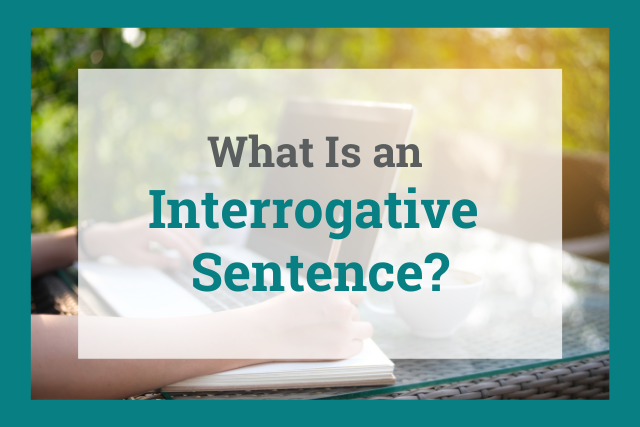
There are four types of sentences in the English language, and all of them accomplish different things.
If you want to be a successful writer, you’ll need to understand how to use each one.
One of these types is the interrogative sentence. What is an interrogative sentence? The short answer is that an interrogative sentence is a sentence that asks a direct question and ends with a question mark.
This article will explain what an interrogative sentence is and teach you how to construct one correctly.
What Is an Interrogative Sentence?
An interrogative sentence is basically another word for a question. Every interrogative sentence ends with a question mark and asks some kind of direct question.
Interrogative sentences are aptly named because their purpose is to interrogate.
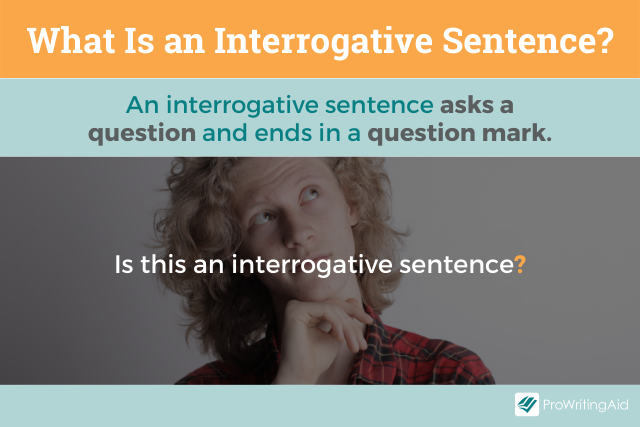
Here are some examples of interrogative sentences:
- Who are you?
- What’s going on here?
- Is that a llama or an alpaca over there?
How Do Interrogative Sentences Differ from Other Types of Sentences?
Interrogative sentences are one of four types of sentences in the English language.
The other three types of sentences are declarative, exclamatory, and imperative sentences.
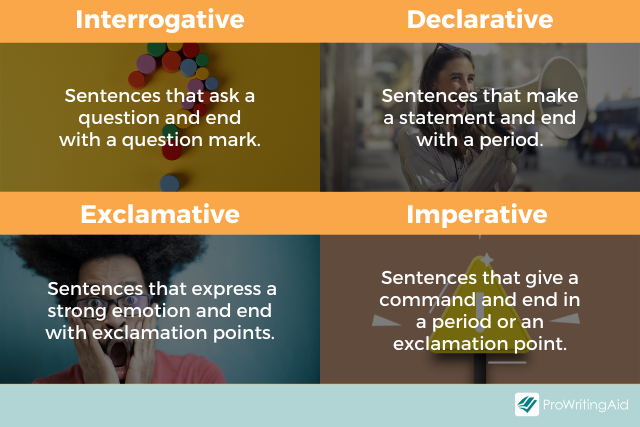
Declarative Sentences
Declarative sentences make a statement and end with a period.
Examples of declarative sentences:
- I’m going to be a published author someday.
- Two of her friends came late to her birthday party.
- I like alpacas more than llamas.
Exclamatory Sentences
Exclamatory sentences express a strong emotion—surprise, joy, or anger, for example—and end with exclamation points.
Examples of exclamatory sentences:
- Hurray!
- Darn it!
- Aw, what a cute alpaca!
Imperative Sentences
Imperative sentences give a command, and end with either a period or an exclamation point.
Examples of imperative sentences:
- Go away!
- Dance like nobody’s watching.
- Please let me pet that alpaca.
If a sentence makes a statement, expresses a powerful emotion, or gives a command, you know it’s not an interrogative sentence.
More importantly, interrogative sentences are the only type of sentence that end in a question mark, which makes them easy to recognize.
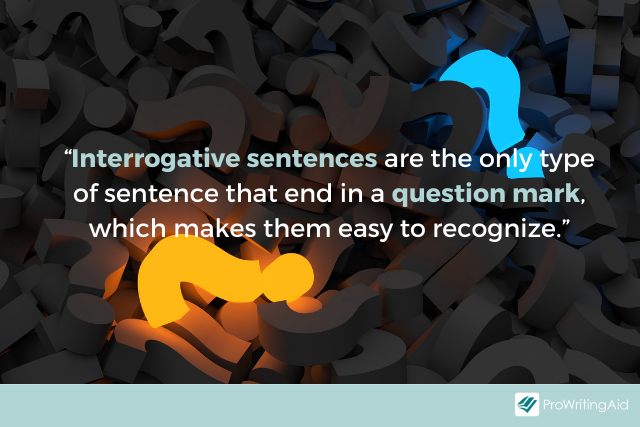
What Are the Different Types of Interrogative Sentences?
There are three different types of direct questions. An interrogative sentence can ask any of these three types of questions:
- Yes/no questions
- “Question word” questions
- Multiple-choice questions
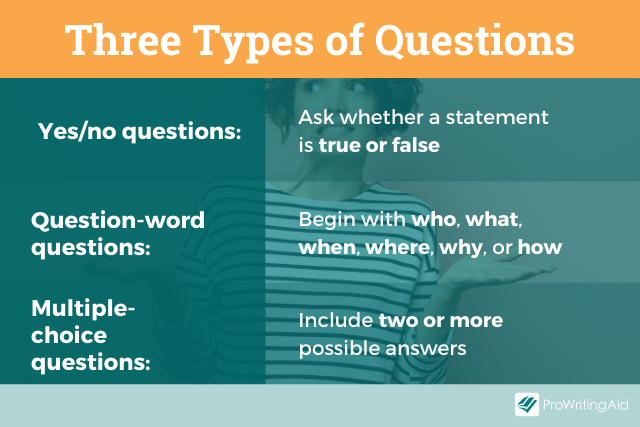
Let’s take a closer look at each type of question.
Yes/No Questions
Some questions have answers that take the form of “yes” or “no.” Essentially, these questions ask whether a statement is true or false.
Examples of yes/no questions:
- Won’t you be cold without a jacket?
- Do you like my new shoes?
- Did J.K. Rowling write the Harry Potter series?
“Question Word” Questions
Some questions begin with a question word.
Question words are who, what, when, where, why and how. The answer takes the form of a declarative sentence.
Examples of “question word” sentences:
- Why is the sky blue?
- Where are you going?
- What are you doing tomorrow?
Multiple-Choice Questions
Multiple-choice questions include two or more possible answers within the question itself.
There’s no limit to the number of choices you can include in a multiple-choice question.
Examples of multiple-choice questions:
- Do you prefer chocolate or vanilla ice cream?
- Should I spend my free time at the mall or the pool this weekend?
- Would you rather learn to speak Spanish, French, Italian, Japanese, or Mandarin?
How Do You Construct an Interrogative Sentence?
All sentences must contain a subject and a verb. These are the two fundamental components of every sentence. Even more important, regardless of the type of sentence, there must be accurate subject–verb agreement. So, if a subject is singular, its verb must also be singular; if a subject is plural, its verb must also be plural.
It's easy to make mistakes with subject–verb agreement but ProWritingAid has your back. Its grammar report checks for thousands of mistakes, including incorrect subject–verb agreement.

Sign up for a free account and correct your mistakes in real time.
In an interrogative sentence, the verb usually comes before the subject. This contrasts with the way most other types of sentences are formed, where the subject comes after the verb.
You can invert the subject and verb of a declarative sentence and then add a question mark at the end to turn it into an interrogative sentence. For example:
- I can do this. (declarative sentence)
- Can I do this? (interrogative sentence)
Sometimes you might use two verbs: one main verb and one auxiliary verb. An auxiliary verb is used to help express the main verb.
The most common auxiliary verbs are “to be,” “to have,” and “to do.”
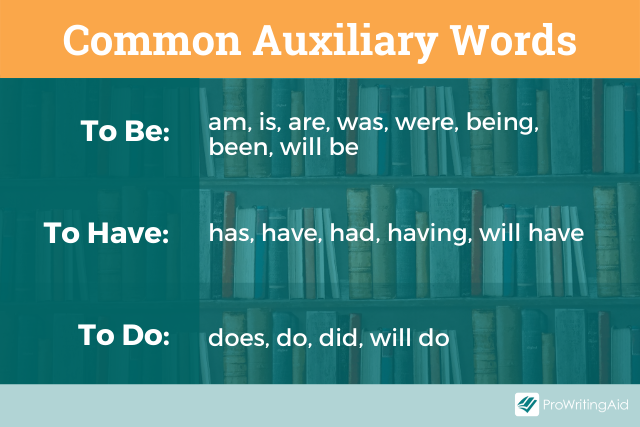
For example:
- I love you. (declarative sentence)
- Do you love me? (interrogative sentence)
In this case, “do” is the auxiliary verb and “love” is the main verb.
The exact sentence structure of an interrogative sentence depends on which of the three categories the question falls into. Let’s take a closer look at how you construct each type of question.
How to Construct Yes/No Questions
To construct a yes/no question, use the following sentence structure:
Auxiliary verb + subject + main verb + remainder
Here’s an example of the construction of a yes/no question:
“Will you stay for dinner?”
- Auxiliary verb: “Will”
- Subject: “you”
- Main verb: “stay”
- Remainder: “for dinner”
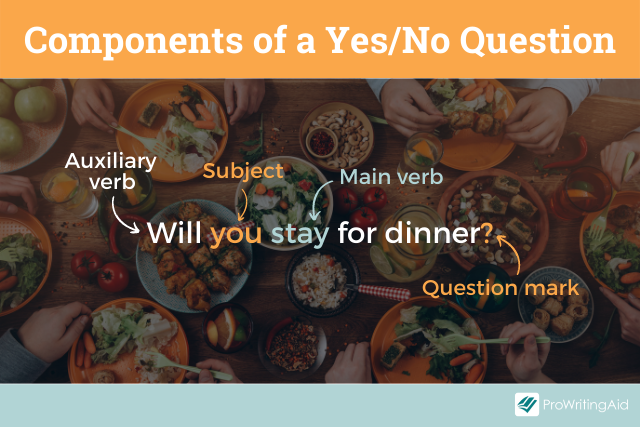
How to Construct “Question Word” Questions
To construct a “question word” question, use the following sentence structure:
Question word + auxiliary verb + subject + main verb + remainder
Here’s an example of the construction of a “question word” question:
“Where did she go last night?”
- Question word: “Where”
- Auxiliary verb: “did”
- Subject: “she”
- Main verb: “go”
- Remainder: “last night”
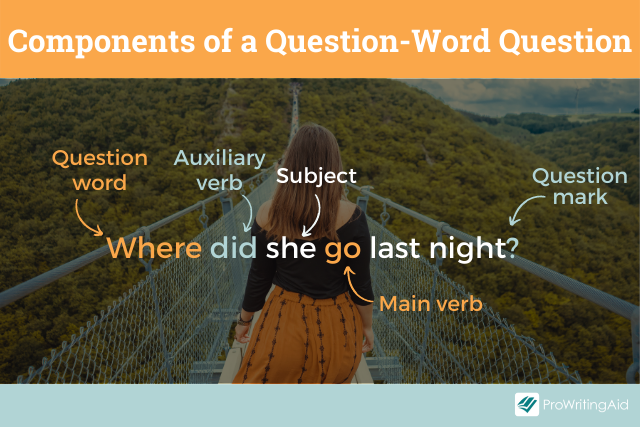
How to Construct Multiple-Choice Questions
To construct a multiple-choice question, use the following sentence structure:
Auxiliary verb + subject + main verb + choice 1 + “or” + choice 2
If there are more than two choices, you can separate them all with commas and simply add an “or” before the final choice.
Here’s an example of the construction of a multiple-choice question:
“Should we study at the library or at my house?”
- Auxiliary verb: “Should”
- Subject: “we”
- Main verb: “study”
- Choice 1: “at the library”
- “or”
- Choice 2: “at my house”
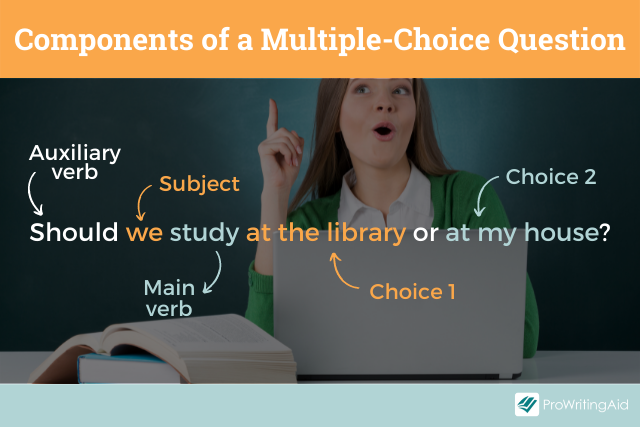
What Are Examples of Interrogative Sentences in Literature?
Let’s take a look at some examples of interrogative sentences from successful books.
Notice how every sentence ends in a question mark. See if you can figure out whether these questions are yes/no questions, “question word” questions, or multiple-choice questions.
“The world has raised its whip; where will it descend?”—Mrs. Dalloway by Virginia Woolf
“Can your brain scab over a memory like your flesh does a wound?”—All Our Wrong Todays by Elan Mastair
“Why is there always a little hum of hate running alongside love?” —Lost Children Archive by Valeria Luiselli
“Who would think that an adolescent boy would have anything to teach an old woman?”—The Snow Child by Eowyn Ivey
“He raised his eyes to me and saw—what? A criminal? A victim?”—Defending Jacob by William Landay
“And what can life be worth if the first rehearsal for life is life itself?”—The Unbearable Lightness of Being by Milan Kundera
“Have you ever seen so many men doing nothing so busily?”—The Scorpio Races by Maggie Stiefvater
“How much resilience did we have? What was our limit? What would be left in the end?”—Becoming by Michelle Obama
“How do you compare sadness that takes over like an erupted volcano to sadness that stays inside one, still as a stillborn baby?”—Where Reasons End by Yiyun Li
“Have you ever had a hunger that whetted itself on what you fed it, sharpened so keen and bright that it might split you open, break a new thing out?”—This Is How You Lose the Time War by Amal El-Mohtar and Max Gladstone
“Sometimes I wondered what it might take to break Andy out of his math-nerd turret: a tidal wave? Decepticon invasion? Godzilla tromping down Fifth Avenue?”—The Goldfinch by Donna Tartt
“Did the ants feeding on a puddle of spilled soda experience its sweetness? Or were they too simple for that and only responding programmatically?”—Fall; Or, Dodge in Hell by Neal Stephenson
“What if it hadn’t been as whole as it had seemed? What if my ending hadn’t carried the terrible tragedy of the song to anyone but myself? What if my tears seemed to be nothing more than a child’s embarrassing reaction to his own failure?”—The Name of the Wind by Patrick Rothfuss
“What could he say? How could he convey the hours—hundreds of hours—spent bent over ledgers, his eyes swimming in the dim light of a dull glave while his mind traced the arabesques and coils of an alphabet that looked like music sounded? How could he explain that it had fit his mind as nothing else ever had, like numbers to a mathematician, or air to a flute?”—Strange the Dreamer by Laini Taylor
Final Words
Now you know how to identify and construct interrogative sentences.
Was this article helpful? Let us know in the comments.


